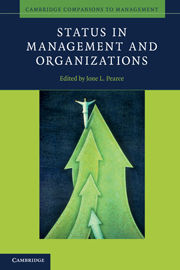Book contents
- Frontmatter
- Contents
- Figures
- Tables
- Contributors
- Foreword
- Preface
- 1 Introduction: The power of status
- Part I How status differences are legitimated
- 2 Divergence in status evaluation
- 3 Maintaining but also changing hierarchies
- Part II The influence of status on markets
- Part III The role of status in new industries and ventures
- Part IV When ascriptive status trumps achieved status in teams
- Part V Status in the workplace
- Part VI Developing status and management knowledge
- Index
- References
2 - Divergence in status evaluation
Theoretical implications for a social construction view of status building
from Part I - How status differences are legitimated
Published online by Cambridge University Press: 05 June 2012
- Frontmatter
- Contents
- Figures
- Tables
- Contributors
- Foreword
- Preface
- 1 Introduction: The power of status
- Part I How status differences are legitimated
- 2 Divergence in status evaluation
- 3 Maintaining but also changing hierarchies
- Part II The influence of status on markets
- Part III The role of status in new industries and ventures
- Part IV When ascriptive status trumps achieved status in teams
- Part V Status in the workplace
- Part VI Developing status and management knowledge
- Index
- References
Summary
One theme that consistently arises in the literature on status is the persistence and stability of status ordering among individuals and organizations (see Zhou, 2005). Yet, existing studies purporting to address this phenomenon do not directly model the effect of relevant variables on the degree of instability in status that results from the process of inter-subjective evaluation. As a result, while previous studies shed much light on the understanding of the emergence of status, they fall short of revealing a detailed picture of the mechanisms by which actors in an organization (or a community or a market) “socially construct” the status order and, in particular, what factors may affect the generation of status instability. Thus, previous field studies largely shun consideration of possible destabilizing forces that may interfere with the process of generating a status order. Since status mobility is most likely to occur when an actor faces a fluid flow of evaluations from others, the lack of examination of instability within status evaluations hinders our understanding of how actors move (or often do not move) along the status order.
Building on the social constructive perspective of status building, in this chapter we argue that the root cause of instability in the process of status evaluation is uncertainty surrounding an actor’s true quality and that the establishment of a stable status ordering comes as a result of how actors deal with perceived uncertainty about the quality of a focal actor. We refer to status in the same spirit as Weber (1968), who used the term “status” in reference to an individual’s or group’s prestige or honor, and Blau (1964), who used the term in reference to an actor’s claim to respect and compliance in relations with others. We focus on the processes affecting the amount of instability in an actor’s status by using the amount of variance in external evaluations as an indicator of status instability. That is, if an actor receives highly divergent evaluations from others, the divergence in received evaluations indicates either uncertainty or lack of agreement about the actor’s perceived status. Conversely, we contend that status reaches a stable state when an actor receives evaluations with a high degree of consensus.
- Type
- Chapter
- Information
- Status in Management and Organizations , pp. 25 - 54Publisher: Cambridge University PressPrint publication year: 2010

